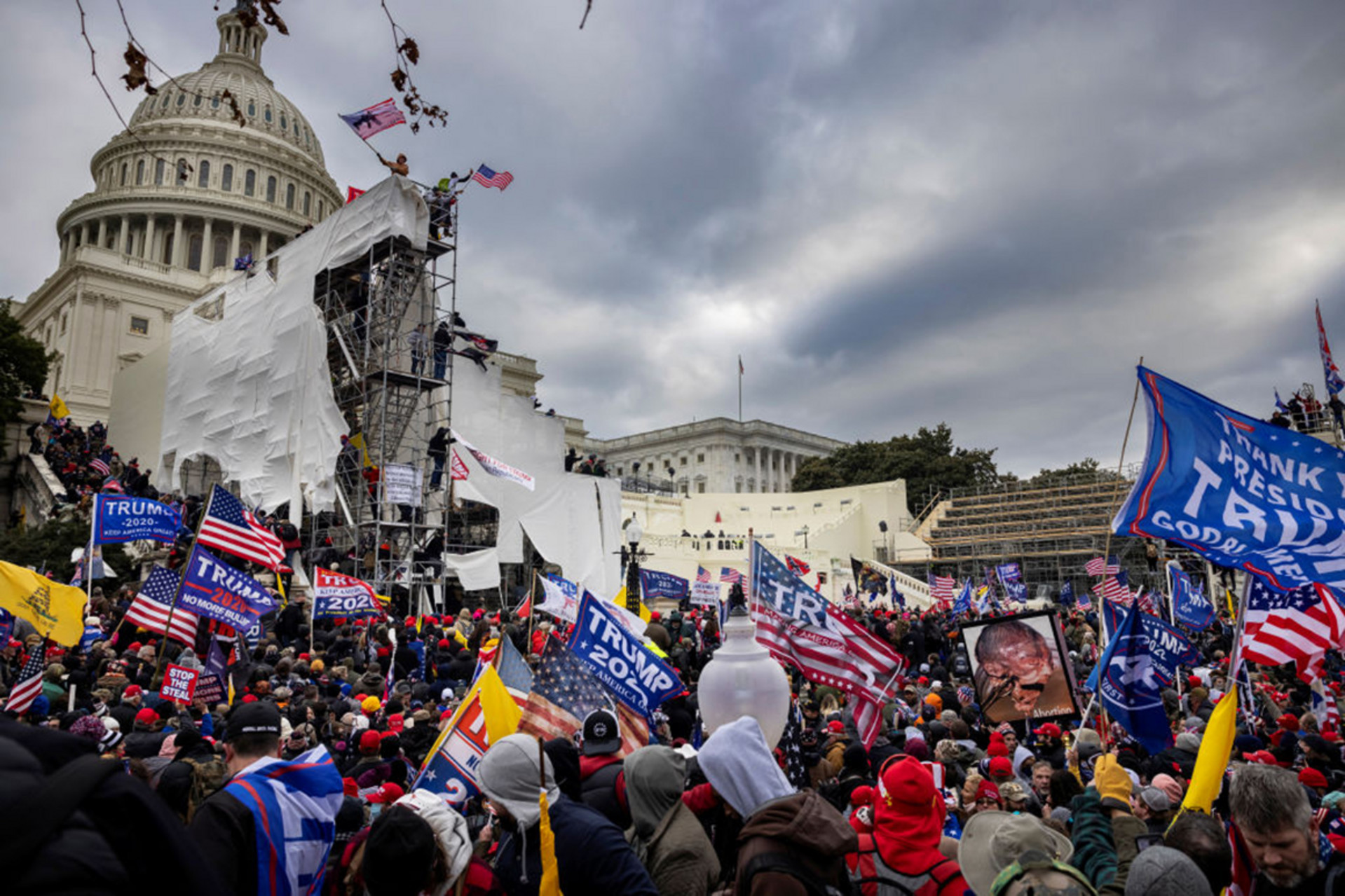On January 6, 2021, loyalists to then-President Donald Trump unleashed a violent attack on the U.S. Capitol building. The riot interrupted the certification of the 2020 election after Trump gave a speech doubling down on his “big lie” that the outcome of voting was fraudulent.
Members of the mob called for former Vice President Mike Pence to be hung for his role in President Biden’s certification, and had erected a gallows ostensibly for this purpose. By the end of the attack, five people had died, hundreds were injured, and Americans watched as members of Congress were forced to evacuate the Capitol.
But just one year later, partisan lines have revealed differing accounts of the day’s events. According to a Quinnipiac poll, 93% of Democrats considered January 6 an attack on the government, but only 29% of Republicans agreed. A poll from the Associated Press and NORC Center for Public Affairs Research found that about 4 in 10 Republicans recall the attack as violent, while 9 in 10 Democrats recall the same.
This trend appears to persist among government officials. Immediately following the attack, House Minority Leader Kevin McCarthy declared Trump responsible for the attacks, while then-House Majority Leader Mitch McConnell said “They tried to disrupt our democracy. They failed.”
Since then, Republican representatives and media personalities have been working to chip away at the collective memory of January 6. Rep. Matt Gaetz claimed the rioters were leftist militants “masquerading as Trump supporters.” Donald Trump has continued to claim that Biden’s election win was the real insurrection, and Fox News anchor Tucker Carlson claimed the FBI set up the attack as a “false flag” operation.
For Jacobin, David Sirota writes that last year’s riot is the unsurprising result of decades of ineffectual government that left economic problems unsolved while enriching a handful of billionaires. As Steve Bannon, former Chief Strategist under Trump, said, “The legacy of the financial crisis was Donald J. Trump.”
Comprehensive research demonstrates this: “in the last 150 years, such financial crises and weak responses in the industrialized world have almost always been followed by an assault on democracy by right-wing authoritarian movements,” said Sirota. “The insurrection was the American version of that global phenomenon.”
House Select Committee
In June 2021, the House voted to create a committee to investigate the Capitol riot. Its search recently revealed text messages between Fox News hosts and former Chief of Staff under Trump, Mark Meadows, which demonstrated the direct connection between Fox News and the White House during the Trump presidency.
During the attack, Meadows received texts from Fox News hosts Laura Ingraham, Brian Kilmeade, and Sean Hannity. “Mark, the president needs to tell people in the Capitol to go home,” Ingraham wrote. “This is hurting all of us. He is destroying his legacy.” She later offered a different opinion on air, claiming the attacks were “antithetical” to Trump’s platform.
Kilmeade encouraged Meadows to have Trump call off the rioters on TV, warning that they were “destroying everything you have accomplished.” Hannity asked, “Can he make a statement? Ask people to leave the Capitol.”
Jeff Cohen, Founder of FAIR and founding director of PCIM, said Fox News hosts were “always signaling their close contact with the White House” during the Trump era. “But these texts are just the hard evidence. This is just how deeply intertwined the Fox News leadership is with Trump and the Trump White House.” Cohen further explained:
“Journalists and media are supposed to be public checks on power, not private advisers to power. A commentator is still a journalist, and even if the commentator doesn’t consider him or herself to be a journalist, they still have to tell the public when they played a role in something they’re commenting on.”
Corporate Donations
Following last year’s attack, many corporations began a freeze on donations to Republicans who voted to overturn the election. Media has since widely reported that companies have resumed spending. The Washington Post wrote that this widespread continued support for the GOP “represents a realization by companies that they face little risk of a public backlash in much of the country for such contributions.”
From the start, corporate lobbyists said corporations would likely resume funding Republican objectors swiftly, and a recent story from The Hill said that “corporate PAC managers are no longer deciding whether to donate to a lawmaker solely based on their vote to object to the election results.”
But, according to a complete review of Federal Election Commission filings in 2021 and 2019 by Popular Information, more than 80% of the thousands of corporate PACs froze some or all contributions after last January 6. The review looked at a subset of senators to compare campaign donations during those two years:
“These 94 Republican objectors raised $11,052,925 from corporate PACs through November 30, 2021, the most recent data available. The same 94 Republican objectors raised $27,205,290 from corporate PACs through November 30, 2019. So while the media narrative is that corporate PAC contributions to Republican objectors have returned to normal, the reality is that they’ve dropped by 60%.”
It remains to be seen whether or not this reduction in donations will affect Republicans, and whether political spending succeeds in making corporations more profitable in the first place. Throughout 2022, the level of Republican support for Trump’s election lies, the House select committee’s investigation, and tangible governance from Democrats will further influence the state of democracy following last year’s insurrection.
Image by Brent Stirton / Getty Images.

